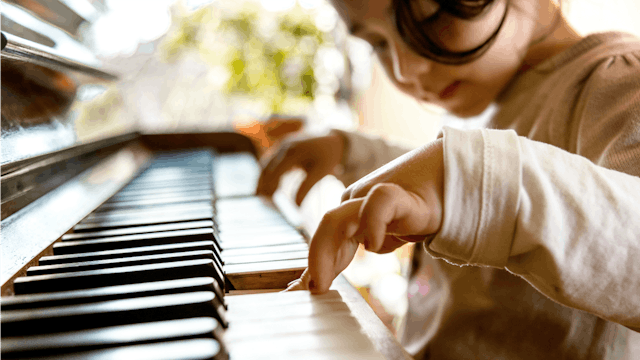Why I Make My Kids Take Music Lessons

When my oldest son was in second grade, we signed him up for piano lessons. He wasn’t exactly thrilled about it, but he agreed. A few years later, we signed up his younger brother. For four years now, our kids have been tickling the ivories (or rather, awkwardly banging the keys). They aren’t musical prodigies by any stretch of the word, and they don’t exactly love music lessons, but we remain steadfast in our commitment.
Why? Why do we continue to spend time and money having our kids learn and practice something that they don’t particularly enjoy?
The reason is simple: Music is important. VERY IMPORTANT.
In fact, music is as important as math, science, or grammar. And in an educational climate that is cutting music classes down to 1-2 times a week (if at all), that just isn’t enough.
Lest you think that I’m some kind of tiger mom who is helicoptering over her children, monitoring their practice time for correct finger placement. WRONG. In fact, I rarely supervise their practice time at all. And I have absolutely no expectations that they will be musicians one day. It has nothing to do with skill, proficiency, or talent. It does, however, have everything to do with the act of playing music.
Let’s be honest, as parents, we make our kids do lots of things they don’t want to do. We make them brush their teeth, go to the dentist, get their flu shots, and practice their spelling. We don’t do these things because we want them to become expert teeth-brushers or spelling bee champions, but simply because we know that these things are part of being a healthy, well-rounded person.
For these same reasons, my husband and I keep making our kids engage in music education. To us, this is just as important as learning chemistry symbols or mathematics skills. They are good for your brain – and your heart.
And science backs that up too. In fact, research shows that music will help our kids develop other skills we consider more “essential” – things like math, spelling, and grammar. A two-year study by researchers at the Brain and Creativity Institute (BCI) at the University of Southern California found that “exposure to music and music instruction accelerates the brain development of young children in the areas responsible for language development, sound, reading skill and speech perception.”
But listening to music isn’t enough to reap the full benefits; you have to actually play music too.
In a recent Ted talk, educator Anita Hall explains the benefits of music – both listening and playing – on the brain. Whereas both activities are helpful to brain development, listening to music uses only one half of the brain, but playing the music requires fine motor skills, which are controlled in both hemispheres of the brain.
Collins said listening to music made the brain light up like fireworks, but when playing music “the little backyard fireworks became a jubilee.”
A brain jubilee. How about that?
“It turns out that while listening to music engages the brain in some pretty interesting activities, playing music is the brain’s equivalent of a full-body workout,” Collins says.
I don’t know about you, but I’m convinced.
So I go through the hassle of scheduling their lessons (not to mention coughing up the money to pay for said lessons). We listen to the whining and I take on the not-so-fun role of reminding (read: nagging) them to practice. Because the benefits outweigh the costs.
Let me be very clear: I DO NOT CARE about whether my kids excel at piano or even if they are that good. I don’t care if they ever learn to play anything more advanced than “Chopsticks.” And I don’t care if they play piano, clarinet, or even the dreaded recorder.
I do, however, care very much about reinforcing that music is important to being a well-rounded human living in the world — just as important as learning science and literature. I care that they step outside their comfort zone, try something new, and learn to hear (and feel) things in a different way. And I care a hell of a lot about helping their brains develop and their hearts grow (because, quite frankly, you cannot tell me that music doesn’t make your heart swell).
By playing music, regardless of their ability, kids learn that these things are valuable. That there’s more to education — and life — than good grades and talent. That art is valuable regardless of skill. And that sometimes practice is more important than proficiency.
This article was originally published on